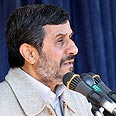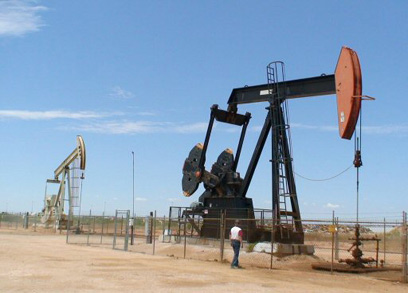
EU agrees on Iran oil embargo
European Union decides to impose ban on Tehran crude. Islamic Republic shrugs off threat, says it has ways to circumvent it; US urges oil importers to 'drastically cut' Iran deals
The agreement, news of which sent crude oil prices higher, followed talks in the last days of December between EU envoys, diplomats said. Objections to the idea, notably from Greece, were dropped during the talks, they said.
Related stories:
- Iran defiant amid appeals for European sanctions
- Barak: Iran is feeling the pressure
- Iran: Currency plunge not tied to sanctions
"A lot of progress has been made," one EU diplomat said, speaking on condition of anonymity. "The principle of an oil embargo is agreed. It is not being debated anymore."
A European ban on Iranian crude would be part of concerted Western action to put pressure on Tehran to abandon its nuclear program, which many governments worry aims at producing an atom bomb. Tehran insists its aims are peaceful only.
The United States imposed new sanctions on New Year's Eve to cut financial institutions that work with Iran's Central Bank off from the US financial system, thus blocking off the main source of Tehran's payments for crude.
The United States welcomed the EU's decision, saying it was a move that would "tighten the economic noose on Tehran."
US State Department spokeswoman Victoria Nuland called the EU moves "the kinds of steps that we would like to see not just from our close allies and partners in places like Europe but from countries around the world. We do believe that this is consistent with tightening the noose on Iran economically," she said.
Following the EU's decision, the US further urged major importers of Iranian oil to "significantly" cut their purchases. The Obama administration hopes that by coordinating a strategic international response, the move will not destabilize global oil markets.
Diplomats said there was still a debate among European capitals over whether to enforce a crude ban immediately after it is agreed or to wait a few months. Some EU member states are concerned about the economic impact of an embargo at a time when Europe is struggling with massive debt problems.
Iran supplies a total of around 450,000 barrels per day to EU member states, making the bloc collectively the second-largest market for Iranian oil after China.

Separate from politics? (Illustration: AFP)
EU Energy Commissioner Guenther Oettinger has said that if there were a ban on Iranian imports, supplies could be bought from elsewhere, notably leading OPEC member Saudi Arabia.
'We can circumvent embargo'
A US Treasury official said Tehran's oil revenues could be choked off without disrupting global oil markets.
Treasury Secretary Timothy Geithner will travel to China and Japan next week to discuss US sanctions on Iran and the state of the global economy.
Iran has alternatives in place to let it cope with the planned EU ban on its oil and increased US pressure, as well as plans to keep up exports of some 2.3 million barrels per day in 2012, a senior Iranian oil official said Wednesday.
Tehran had already considered different routes if that were to happen, Mohsen Qamsari, Iran's international director of the National Iranian Oil Co (NIOC), said.
"We could very easily replace those customers," Qamsari said. Some, but not all, of any displaced volume could move into China as well as other Asian countries and Africa, he said. Iran was unlikely just to store crude on tankers as that was only a short-term solution.
He said he expected shipments would remain unchanged this year and the volume of term, or annual, contracts was unchanged. "We've got very high demand from our lifters, so we have the same quantity (just above 2.3 million bpd) in our term contracts."
Qamsari said Washington's tough tactics had already made life difficult. "We are supplying our crude, but receiving the money with some difficulty – for sure," he said. Tehran had "created some channels" for payments, he added.
The International Energy Agency estimates Iran exports about 450,000 bpd to the European Union.
The NIOC official said Europe's longstanding buyers of Iranian crude – among them France's Total and Italy's Eni – have voiced concern about potential EU sanctions, but had yet to cut back on contractual supplies.
Any punitive moves by Brussels could cause European consumers to suffer through higher prices at the pump, he said.
Tehran has warned it could shut the Strait of Hormuz, a shipping chokepoint through which more than 40% of the world's oil is shipped, if sanctions were imposed on its crude exports.
"My wish is that won't happen," Qamsari said. "We've been trying to separate our crude oil business from politics."
- Receive Ynetnews updates directly to your desktop











